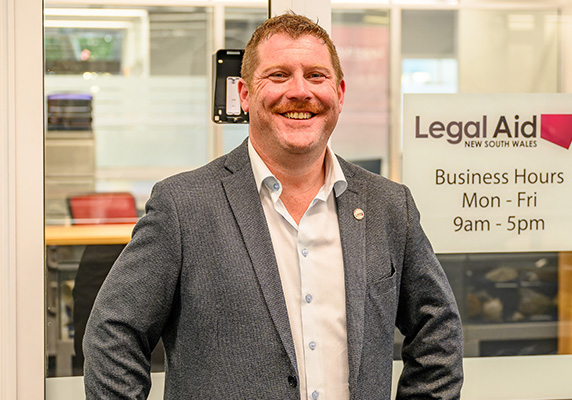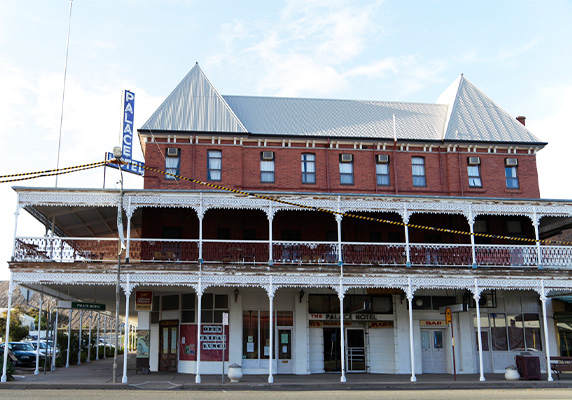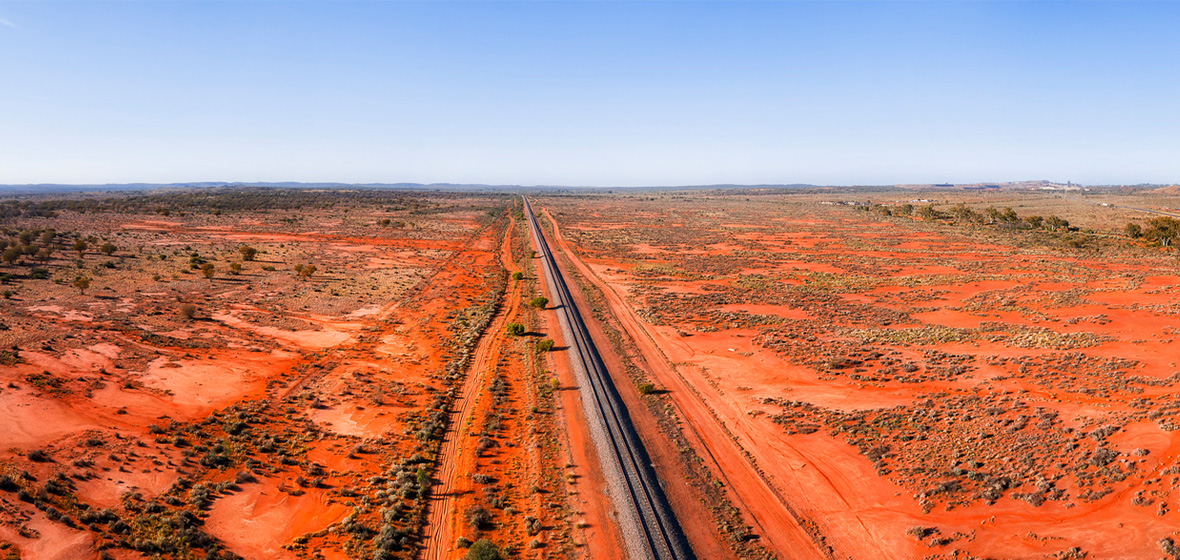What was intended to be a six-month adventure in Broken Hill turned into a much-loved job and lifestyle for Legal Aid lawyer Steven Wright
Steven Wright, practice manager of Legal Aid NSW’s Broken Hill office, is the unlikely star of a short film produced by the Regional Australia Institute. In the opening scene, he appears as a slightly alarming, orange-tinged cartoon figure, superimposed over a map of Australia and obscuring almost all of the Northern Territory.
His avatar then becomes himself, and Wright begins to warmly spruik the advantages of life in the remote desert city near the border of NSW and South Australia.

Wright explains that he represents people in criminal matters in Broken Hill, Wilcannia and Wentworth, and leads a team of lawyers in civil, family and criminal law.
An adventure for six months
Wright and his partner have lived in Broken Hill for four years. Speaking to LSJ, Wright says that they both love the lifestyle they have found.
Wright, who was born in the Snowy Mountains, was working for Legal Aid in Dubbo when the job came up in Broken Hill. “It was actually my partner who said yes, not me,” he says.
“It came up at a dinner that I was having with my boss and his wife. My boss and I were in the kitchen making dinner, and his wife bought it up with my partner. And when I came back to the table, she said, ‘The boys have agreed to move to Broken Hill.’ I said, ‘Ah, did we!?’
“We thought it would be an adventure for six months and it would be good to see a different part of the country,” he says, “and we fell in love with it and … stayed.”
Broken Hill is a silver, zinc and lead mining town that has lost most of its mines, but everything from the skyline to the street names is reminiscent of the glory days. When Wright arrived in town, he was given offices on Argent Street.
“We were in a granny flat out the back of Lifeline,” he says, “and there was only me and a temp-contract family lawyer. We had to see clients on the front lawn. And, quite often, if our printer broke it would take two weeks to get it fixed.”
Easy to fit in
The new offices of Legal Aid NSW opened in July 2023, on Sulphide Street (Chloride Street runs parallel to the east and Bromide Street to the west). From the window of his office, Wright can see the line of lode.
Wright says it was easy to fit in socially. “Because we’re thousands of kilometres from anywhere else, the people that you meet here become close very quickly,” he says. “So we have a good lot of friends who are pretty much like family to us. And it’s a very diverse town. That was very unexpected for us. You go and sit in the Palace on a Friday night, and you can talk to a miner and a drag queen and a doctor – all sitting at the same table and having a chat.”
The remarkably decorated Palace Hotel – it looks like a cross between the faraway Sistine Chapel and the nearby Pro Hart art gallery – is the setting for many scenes in the founding cinematic text of Australian drag culture, The Adventures of Priscilla, Queen of the Desert.

“I knew Priscilla was filmed here but I didn’t realise what a gay mecca it actually is,” says Wright. “We’ve got a huge drag culture. I’ve gone to more drag acts in Broken Hill than I ever imagined. And it’s not this segregated, off-in-it-own-space kind of thing. It shares a space with what would traditionally be the front bar where all the men were.”
The area serviced by Wright’s offices is “about the size of Germany,” Wright says. Although he has virtually no commute to work, he still has to cover long distances on the road.
“We don’t tend to fly anywhere,” he says. “So when we’re on the circuit, there’s a lot of podcasts – because there’re no radio stations in between. And there’s an extra day there and back that gets factored into court time. But when we’re working in Broken Hill, if you can’t get to work within five minutes you must be going the long way to pick someone else up.”
He does not walk, because nobody in Broken Hills walks anywhere. “I’m not sure why we have footpaths,” he says, “because when you go to the coffee shop and you can’t park out the front, instead of parking a street away you just do a lap and wait for someone to leave.”
And the coffee shops are another draw for Wright, who says that they “rival anything that I’ve experienced living in a big city … excellent coffee, excellent brunch, excellent nightlife”.
‘rivalling anything that I’ve experienced in a big city’
Broken Hill has not traditionally been known as a foodie destination, but Wright says, “People always ask, ‘Do you get excited to get back to Sydney or to Adelaide to get something to eat?’ And the answer is ‘no’.
“There’s some really good restaurants here which we frequent quite a lot, because there’s always somebody having a celebration for something.”
Not necessarily on paperwork
The Far West is home to a comparatively large Indigenous population. First Nations people make up 10.8 per cent of residents; the majority live in Broken Hill and almost 50 per cent are under 25 years old. The new Legal Aid offices are also the base for the Civil Law Service for Aboriginal Communities and the Family Law Service for Aboriginal Communities.
“Bail seems to be a huge issue for Aboriginal people,” says Wright, “because of the preconditions we set for it, like needing a stable house. Housing is another quite big issue: quite often, houses are passed down through generations – from grandparents and parents to sons and daughters and then down to grandkids – and it’s always known that that house is owned by that particular family, but it’s not necessarily done on paperwork.
“A lot of our Aboriginal clients don’t necessarily live in the same house every night. That’s just accepted; it’s not an unusual thing.
“There’re always weird prescriptions that are put in relation to conditions that seem sensible but are not always [easily] adapted to a different lifestyle from those who make the laws. For example, kids on bail might have an address that they’re meant to stay at every night, but some nights they might go to stay with their aunty or their grandma. The whole purpose of it is that they’re not out and about, but they can be breaching their bail when they’re at Grandma’s house when they’re meant to be at Mum and Dad’s house.”
Levels of drug offences are disproportionately high and treatment options are sorely limited. “Now that we’ve got a bigger office, I think that might be my next project – a residential rehab that people don’t have to move thousands of kilometres away from their family to attend,” says Wright.
Unexpected comforts and rewards
Working in an isolated community brings unexpected comforts and rewards.
“In bigger regional centres or Sydney, you don’t necessarily know your clients on a deep level prior to representing them,” says Wright, “and you don’t necessarily get to see what happens to them after. But in Broken Hill, our clients have always been really appreciative of what we do – because they haven’t previously had that service offered to them. And, obviously, we get to see what happens six months, 12 months, 18 months, two years down the track.”
‘In bigger regional centres or Sydney, you don’t necessarily know your clients on a deep level prior to representing them, and you don’t necessarily get to see what happens to them after.’
Wright is modest about his successes – in fact, he does not even mention them – but since Legal Aid expanded in Broken Hill delays have been reduced in District and Local courts and the number of young people in court for criminal offences has fallen. In 2022, Wright was awarded Legal Aid NSW’s Criminal Division Award for Service Excellence, and he has been elected president of the Far West Law Society.
Much more creative
“I think there’s a lot of people who would benefit greatly from coming out into the regions,” says Wright, “getting a huge range of experience, but also learning a lot. My legal practice has become much more thought out and much more creative, because when you don’t have all the resources at your fingertips you have to think, ‘How can we make a law work for us, and what do we have that can make the law work?’ Someone might need a psychiatric report but we don’t have a psychiatrist to provide it, so what can we do instead? And what does law say that we require in order to get bail, and what is actually available? It makes you think critically about the law.”
Broken Hill’s diverse community includes an eclectic range of offenders and offences. It’s like juggling duelling football codes. A bit.
“We are at the border of rugby league and AFL,” says Wright. “You can’t say that you love or hate one of them, because you’ve got to like both. And that’s a little like how we practice. We’re on the border. We get a bit of everything. And you can’t really say that you love or hate anything, because you’re expected to do all of it.”
Wright’s partner, James, works with children and people with disabilities. He has been promoted several times in Broken Hill “and now has a job that he absolutely loves”, says Wright. “So it’s been an excellent career progression for both of us, really.”
But after four years of desert living, are they planning to stay in Broken Hill?
“We’ve bought our house now,” says Wright, “which is some of the cheapest real estate in Australia. We’ve waited the nine months to coordinate all the tradies to get a new kitchen in. Now that I have the house and the kitchen of my dreams, there’s no point of departure any time soon …”
But what does Wright think of his avatar?
“I would’ve made him less orange,” says Wright, who prefers to think of himself as “chestnut”.




